
Any relief that commuters experienced in the latter half of 18 April, as taxi aggregators Ola and Uber temporarily suspended surge pricing, was rather short-lived.
Surge pricing is adopted by app-based cab services during periods of high demand. And revoking the same led to a major lack of cabs on the roads the very next day. Plus, when available, they were at least 20 minutes away from the pick-up point.
According to these online cab services, surge pricing ensures reliability and availability to those who agree to shell out a bit more than normal. However, Ola and Uber had to withdraw this peak pricing strategy due to a litany of commuters' complaints over the astronomical pricing. As a result, Delhi Chief Minister Arvind Kejriwal intervened and issued a warning to the cab aggregators.
So why exactly is the government dictating terms to private cab hailing services? And, on the other hand, is surge/peak pricing really fair, specially given that the second phase of CM Kejriwal's Odd-Even scheme is adding to commuter woes.
Should a government intervene in the operations of private cab services?
Consider this - a commuter pays a Tatkal fare while booking a train ticket at the last minute. Guests pay extra money for last minute hotel bookings. In the same manner, commuters pay extra when there are lesser cabs on the road. In a time of scarcity, you shell out more to avail services.
In a Twitter conversation, Uber mentioned that the government is interfering with market dynamics. This leads to fewer cars and a negligible impact on requests.
@prasanto Interfering with market dynamics leads to fewer cars and neglegible impact on requests - leading to prolonged surged periods
— Uber Delhi (@Uber_Delhi) April 18, 2016
There’s life between zero and 5x surge, you know. What about capping surge at 2x during Odd-Even? @Uber_Delhi https://t.co/4qJGhN3JBc
— Prasanto K Roy (@prasanto) April 18, 2016
In a conversation with Catch, Uber India mentioned that flexible pricing is their modus operandi. Demand dictates market mechanism, and regulation of demand and supply is simple market dynamics. Surge pricing is fundamental and needs to be in place to let taxis ply efficiently.
"Airlines and hotels are more expensive during busy times. Uber is, as well. We don't just charge to make a buck - we take a small fee of the transaction, and a majority of the fare goes to the driver so we can maximise the number of drivers on the road. The point is, in order to provide citizens with a reliable ride, prices need to go up temporarily," said Uber.
Uber just shared this message with its customers:
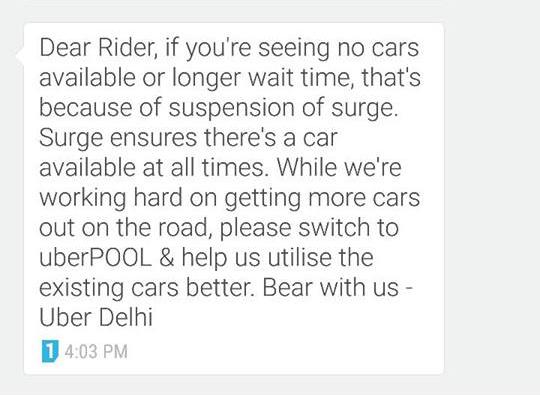
Ola made a statement as well. "To make Govt's Odd Even initiative a success, Ola has temporarily pulled out Peak Pricing in Delhi NCR. We have also rolled out an on-ground campaign where volunteers are spreading the message of ride-sharing and car-pooling in support of the scheme," a company statement said.
Is surge pricing illegal?
Demand and supply is a market rule. And Taxi aggregators follow the same norm. When there's a higher demand for taxi services than those plying on road, the surge pricing model comes into effect. A surge pricing algorithm is applied to equalise supply and demand. A research paper published on peak pricing explains:
"The algorithm assigns a simple multiplier that multiplies the standard fare in order to derive the surged fare. The surge multiplier is presented to a rider in the app, and the rider must acknowledge the higher price before a request is sent to nearby drivers."
Drivers are free to work whenever they want and they must be incentivised for their services. It must be noted that as soon as more drivers are available, the surged price goes down and standard rates are applicable.
However, the current situation is that commuters, though happy with the standard rates, are finding it tough to actually get an app-based cab to take them to their destination. Between the Delhi government and cab aggregators, it is the hapless commuter who is left stranded.
First published: 19 April 2016, 7:15 IST

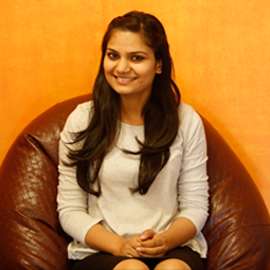
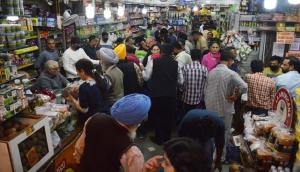
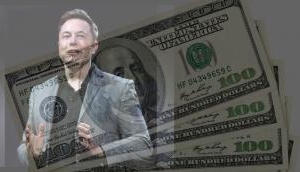
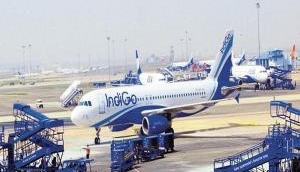

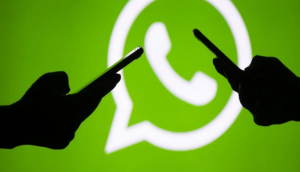
![BJP's Kapil Mishra recreates Shankar Mahadevan’s ‘Breathless’ song to highlight Delhi pollution [WATCH] BJP's Kapil Mishra recreates Shankar Mahadevan’s ‘Breathless’ song to highlight Delhi pollution [WATCH]](http://images.catchnews.com/upload/2022/11/03/kapil-mishra_240884_300x172.png)

![Anupam Kher shares pictures of his toned body on 67th birthday [MUST SEE] Anupam Kher shares pictures of his toned body on 67th birthday [MUST SEE]](http://images.catchnews.com/upload/2022/03/07/Anupam_kher_231145_300x172.jpg)






